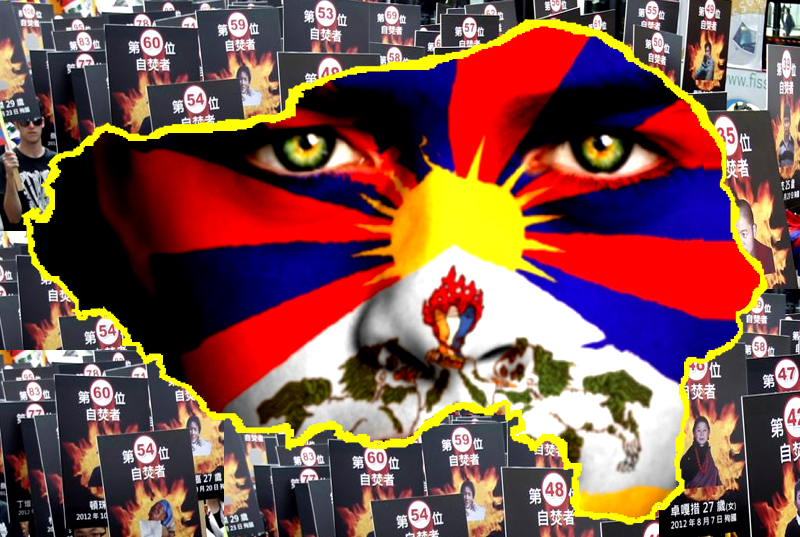 Dharamshala, India — Working conditions for foreign correspondents and news organisations in occupied Tibet and Eastern Turkistan as well as many parts of China deteriorated last year, with journalists reporting being severely beaten, detained and harassed, according to a survey published on January 31, 2018.
Dharamshala, India — Working conditions for foreign correspondents and news organisations in occupied Tibet and Eastern Turkistan as well as many parts of China deteriorated last year, with journalists reporting being severely beaten, detained and harassed, according to a survey published on January 31, 2018.
The Beijing-based "Foreign Correspondents' Club of China" (FCCC), says problems in these areas are symptomatic of a growing difficulty faced by foreign journalists and news organisations. The FCCC said the results "provide strong evidence to suggest that, from an already very low baseline, reporting conditions are getting worse".
The Chinese communist regime in Beijing intensified attempts to restrict foreign journalists' access to many parts of China, including occupied Tibet and Eastern Turkistan in 2017, the FCCC has said after conducting an annual survey of its members. The government is also increasingly using the visa renewal process to pressure correspondents and news organisations whose coverage it does not like, the club found.
"Tibetan-inhabited regions" (Occupied territories in Tibet) are among many difficult areas, including "the areas near the border with North Korea; areas near Chinese borders with south-east Asian countries; and in industrial districts such as steel-producing districts". The survey was completed by 117 out of 218 of the club's correspondent members.
Almost half of more than 100 correspondents were subjected to some form of interference in 2017 while attempting to gather information, the FCCC report said, adding that, twenty-three per cent said they were physically obstructed from accessing a location and 8 per cent said they were manhandled or beaten.
In the survey, which was conducted in December, 40 percent of respondents felt reporting conditions in 2017 had deteriorated from the year before, compared with 29 percent in 2016. Reporting became more difficult in many areas of China, but especially in Xinjiang, China's heavily-securitised far west region, the FCCC said.
72 percent of respondents who traveled to the region were told by officials and security agents that reporting was prohibited or restricted, compared with 42 percent in the previous year. Respondents also reported greater difficulties in renewing their visas, with 15 percent saying they encountered problems during the process, an increase from 6 percent in the previous year. Twice the number of respondents compared to 2016 said the problems were related to their reporting.
The communist regime says China has a basic policy of "opening up to the outside world" including protecting the rights of foreign journalists, who may interview anyone who gives prior consent. But correspondents reported growing pressure by Chinese officials on foreign news outlets.
The international watchdog Freedom House recently published a report called Freedom On the Net 2017: Manipulating Social Media to Undermine Democracy, in which China was once again found to be the worst abuser of internet freedom, and Tibet was among China's top censored search keywords. "China is ranked the "world's worst abuser of internet freedom, followed by Syria and Ethiopia" in 2017, according to the report.
"The Chinese government maintains a sophisticated censorship apparatus, including both automated mechanisms and human monitors, to block online criticism of individuals, policies, or events considered integral to the one-party system." The report went on to note that Tibet was one of the targeted topics for censoring, as Tibet, along with Taiwan and Tiananmen Square, were systematically blocked by the Chinese authorities.
The report said, "The most censored breaking news topics were related to the reputation of the party or officials, health and safety, foreign affairs, official wrongdoing, media censorship, or civil society activism. There was also consistent and systematic censorship of content addressing long-standing taboos such as the Cultural Revolution, the 1989 crackdown on Tiananmen Square protesters, Taiwanese independence, repression of minorities in Xinjiang and Tibet, and the banned spiritual group Falun Gong.
The Chinese Communist regime began their invasion of Tibet in 1949, reaching complete occupation of the country in 1959. Since that time, more than 1.2 million people, 20% of the nation's population of six million, have died as a direct result of China's invasion and occupation. In addition, over 99% of Tibet's six thousand religious monasteries, temples, and shrines, have been looted or decimated resulting in the destruction of hundreds of thousands of sacred Buddhist scriptures.


![Tibet has a rich history as a sovereign nation until the 1950s when it was invaded by China. [Photo: File]](/images/stories/Pics-2024/March/Tibet-Nation-1940s.jpg#joomlaImage://local-images/stories/Pics-2024/March/Tibet-Nation-1940s.jpg?width=1489&height=878)















